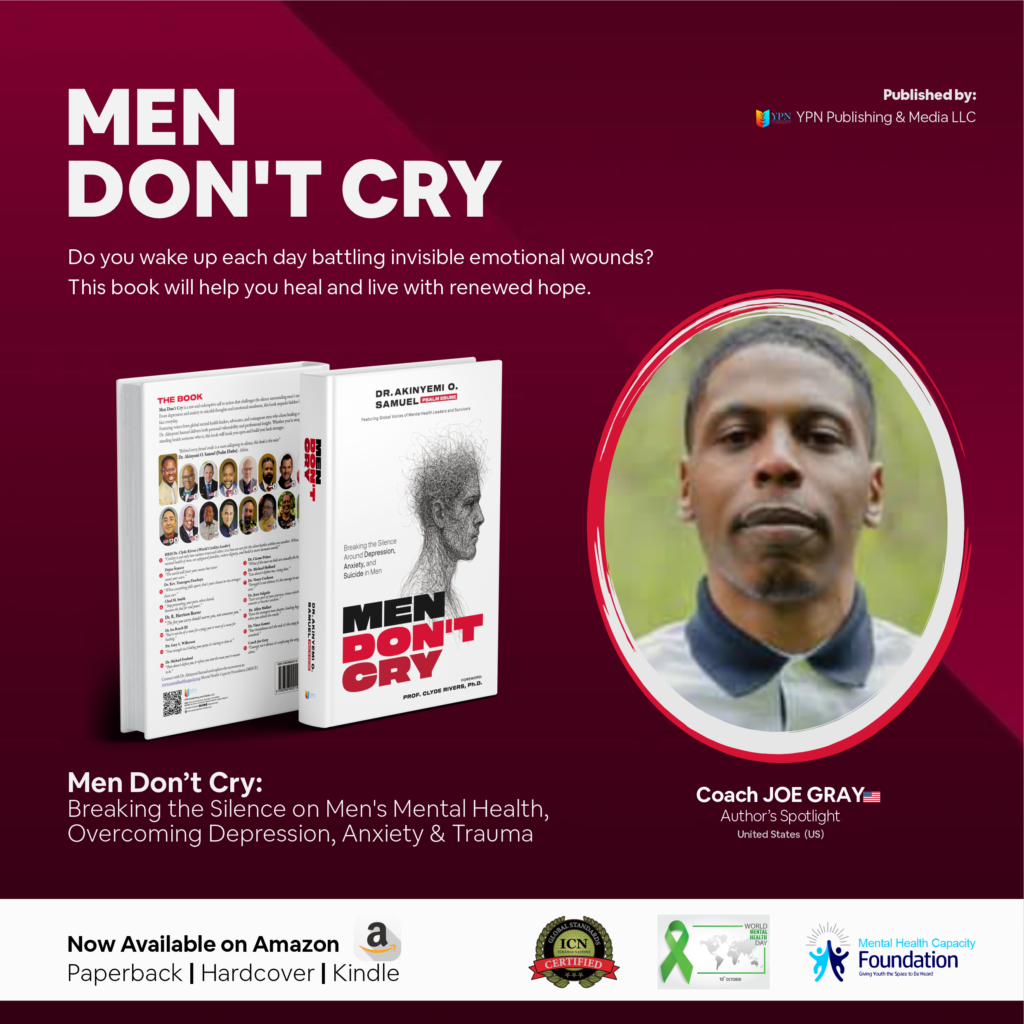Sheridan, USA October 04, 2025 Innovation Times Senior Correspondent
As the world prepares to mark World Mental Health Day on October 10 with the theme “Breaking the Silence: Men’s Mental Health and Access to Care in Times of Crisis,” a powerful voice is set to shift the conversation. Coach Joe Gray, author of the chapter The Myth of the ‘Real Man’ in the groundbreaking book Men Don’t Cry, will address an audience of global thought leaders, professionals, and everyday men navigating invisible struggles. His message dismantles a narrative that has shaped and too often suffocated masculinity for generations.
“Real men don’t do this. Real men don’t do that. Real men, I mean, real men do this. Real men do that.” Those words, which open his chapter, are not just a reflection of his personal frustration. They are a mirror of the relentless scripts that men across cultures have been handed. The rulebook of masculinity, as Coach Gray describes it, is full of contradictions and impossible expectations. What society calls a “real man” shifts with time, culture, and context, leaving many men in silent turmoil.
For Gray, the damage lies not in a single phrase, but in the collective weight of them all. The myth of the “real man” has dictated how men eat, speak, walk, earn, and even how they grieve. It has mocked their vulnerability and demanded stoicism at the expense of their health. And in this relentless cycle, countless men have been trapped, living half-truths, hiding pain, and breaking silently under the weight of unrealistic expectations.
This is not simply a sociological problem. It is a health crisis. Men who internalize these rigid definitions often suffer in silence, reluctant to seek help for depression, anxiety, or trauma. In many cultures, acknowledging emotional pain is still treated as weakness. That silence has cost lives. The data is sobering: men are less likely than women to seek mental health care, yet suicide rates among men remain significantly higher. Gray’s chapter steps directly into that silence and declares that the myth must end.
But what makes The Myth of the “Real Man” transformative is not just its critique of stereotypes. It is the hope and possibility it offers. Coach Gray refuses to let men be defined by shallow cultural scripts. Instead, he urges readers to look deeper. “What kind of man are you when no one’s watching?” he asks. This is not a rhetorical question but an invitation to self-reflection. It asks men to move beyond performance and into authenticity.
His chapter reminds us that there is no factory mold for manhood. Every man carries his own unique story, his own scars, and his own values. The true measure of a man, Gray argues, is not how well he fits into society’s ever-changing checklist, but how he lives with integrity, honesty, and accountability.
Coach Gray’s voice carries the weight of lived experience. He writes not as an outsider criticizing men, but as a man who has carried the burden of those same rules. He knows the exhaustion of trying to meet every expectation, and he knows the freedom that comes when those myths are dismantled. His words resonate because they are real, raw, and urgent.
For readers, this chapter becomes more than just literature. It becomes a lifeline. Men who have long questioned their worth in silence will find in these pages a validation they may have never received. Families who have misunderstood the struggles of their fathers, brothers, or husbands will find new language for compassion. And communities that have ignored the silent suffering of men will be confronted with a call to action.
The upcoming summit on World Mental Health Day provides the perfect stage for Coach Gray’s message. In a year where economic, social, and personal crises continue to mount, men everywhere are under pressure. Access to mental health care is a lifeline, but access begins with courage. Courage to admit the struggle, courage to speak, and courage to reject the myths that have silenced them for too long.
Gray’s chapter underscores this reality. The façade of the “real man” has prevented too many men from reaching out, and in crisis, silence can be deadly. By breaking the myth, men open the door to healing, to care, and to life.

The resonance of Men Don’t Cry as a book lies in its collective strength. Each chapter, written by voices from around the world, contributes to a global conversation. But The Myth of the “Real Man” is a particularly sharp scalpel, cutting deep into the cultural narratives that strangle men’s mental health. It exposes the lie while pointing to a truth that liberates.
Reading this chapter is not optional for men who are serious about their well-being. It is essential. It challenges without shaming, it corrects without condemning, and it restores dignity to those who have been defined by society’s shifting sands.
For families, the book is also a resource. It provides insight into the struggles men may never articulate aloud. To wives, mothers, daughters, and sisters, Coach Gray’s words are a reminder that silence does not equal strength and that the men they love may need more empathy than they reveal.
The chapter also speaks to leaders such as coaches, pastors, mentors, and executives who wield influence over young men. By rejecting the myth of the “real man,” they can create environments where vulnerability is honored rather than punished.
Coach Gray’s writing is deeply personal, but its implications are universal. In every corner of the world, the myth of the “real man” has played out in different accents and customs. Yet the message remains the same: hide your pain, prove your worth, and never break. By confronting this lie, Gray is not just speaking to men in one culture but to men everywhere.
The clarity of his message also serves as a guide for the next generation. Boys growing up today are watching carefully. If they are told the same myths, they will carry the same wounds. But if they are taught that strength includes vulnerability and that dignity comes from authenticity, they will walk freer paths than their fathers did.
As the summit unfolds on October 10, the presence of Coach Joe Gray will add urgency and credibility to the theme. His chapter is not just preparation for that event; it is a companion for every man who feels the weight of silence.
For those considering whether to invest in Men Don’t Cry, the answer is clear. This book is more than words. It is a movement. It is not only about reading but about changing. And in The Myth of the “Real Man”, Coach Gray has written a piece that demands to be read, shared, and lived.

Copies of Men Don’t Cry are available now in multiple formats:
On this World Mental Health Day, let this chapter serve as a rallying cry. Let it remind us that myths can kill, but truth can heal. Coach Joe Gray has given men a voice and a choice: to stop performing and start living.
The myth of the “real man” ends here. The real story of men, in all their humanity, begins now.
ABOUT THE AUTHOR
Coach Joseph Gray Jr. is all about lifting up young people, speaking truth, and creating spaces where they can just be themselves. He is not just a teacher, he is a mentor, a mental health advocate, and a fighter for those voices that often go unheard. Through his GraySpace Foundation, he tackles teen and young adult mental health head-on, while Tru2You brings youth together to build confidence, self-expression, and healing. As a #1 Amazon International Bestselling Author, his book Unmasking Me: Lost in My Head, Stuck in My Thoughts is not just words on a page, it is a roadmap born from his own struggles, guiding others toward resilience and mental health recovery.
He is out here making sure the next generation knows they are not alone, encouraging them to face the tough stuff, heal, and rise above the stigma. Every action, every word, every project is about turning pain into power and helping young people step into their strength. Visit www.grayspacefoundation.org to see his work in action.



